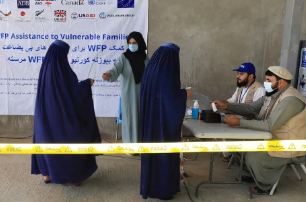UN calls Taliban’s new order an alarming violation of women’s rights and aid access.
News Desk
KABUL: The Taliban has announced that it will close all national and international non-governmental organisations (NGOs) in Afghanistan that employ Afghan women.
The move, which further tightens the group’s restrictions on women, comes just over two years after they ordered NGOs to suspend employing Afghan women, allegedly due to non-compliance with Islamic dress codes.
In a letter published on X (formerly Twitter) on Sunday evening, the Taliban’s Ministry of Economy warned that any organisation found employing Afghan women would have its licence revoked.
The new order aims to enforce a broader policy of gender segregation in Afghanistan, which the Taliban has pursued since taking control of the country in August 2021.
The group insists that all institutions, whether national or foreign, comply with its strict interpretation of Islamic law.
The United Nations expressed grave concern over the announcement, highlighting the detrimental impact it will have on the country’s already dire humanitarian situation.
“This will severely hinder our ability to provide life-saving humanitarian assistance to the Afghan population,” said UN spokesperson Florencia Soto Nino-Martinez. “We are deeply alarmed by the fact that we are talking about a country where half the population’s rights are being denied and are living in poverty.”
Under Taliban rule, women in Afghanistan have been progressively excluded from public life.
They are barred from secondary and higher education, restricted from most jobs, and denied access to parks and many public spaces.
The latest move targets the growing number of NGOs, both national and international, that have been instrumental in providing aid to Afghan citizens in need, including women, children, and vulnerable groups.
The UN has expressed alarm over the impact that the Taliban’s decree will have on its operations in Afghanistan, where over half the population lives in poverty and many face a severe humanitarian crisis.
Humanitarian organisations rely on female staff to reach women and children, who make up the majority of those in need of aid.
The ban on Afghan women working for NGOs will limit the ability of these organisations to carry out vital assistance work, particularly in sectors like healthcare and education.
Volker Turk, the UN’s human rights chief, condemned the Taliban’s decision, saying,
“I am deeply alarmed at the recent announcement that NGOs will lose their operating licenses if they continue to employ Afghan women. This is absolutely the wrong path being taken.” Turk added that the Taliban’s policies were undermining humanitarian efforts and deepening the country’s crisis.
In another development earlier this week, Taliban leader Hibatullah Akhundzada issued a new decree ordering that buildings should not have windows that look into areas where women may be present.
The decree applies to both new buildings and existing structures, with authorities being tasked to ensure that windows do not overlook areas like yards or kitchens.
If windows do provide such a view, property owners must take steps to obscure it by building walls, fences, or screens.
The UN condemned the measure, saying it further entrenches gender-based segregation and limits the freedom of movement for Afghan women.
Critics argue that such measures are an extreme form of control over women’s lives and their visibility in public spaces.
















